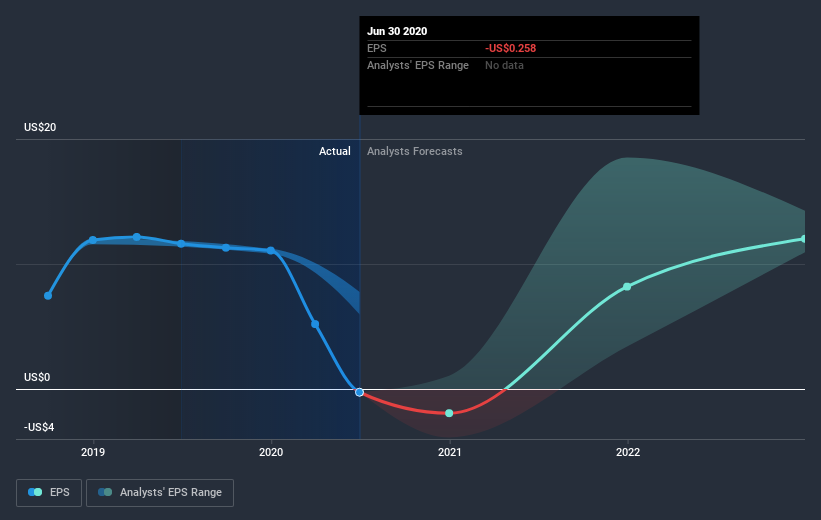Capital One Financial's (NYSE:COF) Stock Price Has Reduced29% In The Past Year

Passive investing in an index fund is a good way to ensure your own returns roughly match the overall market. While individual stocks can be big winners, plenty more fail to generate satisfactory returns. Unfortunately the Capital One Financial Corporation (NYSE:COF) share price slid 29% over twelve months. That contrasts poorly with the market return of 17%. Even if shareholders bought some time ago, they wouldn't be particularly happy: the stock is down 24% in three years. It's down 1.9% in the last seven days.
View our latest analysis for Capital One Financial
There is no denying that markets are sometimes efficient, but prices do not always reflect underlying business performance. One imperfect but simple way to consider how the market perception of a company has shifted is to compare the change in the earnings per share (EPS) with the share price movement.
Capital One Financial fell to a loss making position during the year. Some investors no doubt dumped the stock as a result. Of course, if the company can turn the situation around, investors will likely profit.
You can see how EPS has changed over time in the image below (click on the chart to see the exact values).
This free interactive report on Capital One Financial's earnings, revenue and cash flow is a great place to start, if you want to investigate the stock further.
What about the Total Shareholder Return (TSR)?
We'd be remiss not to mention the difference between Capital One Financial's total shareholder return (TSR) and its share price return. Arguably the TSR is a more complete return calculation because it accounts for the value of dividends (as if they were reinvested), along with the hypothetical value of any discounted capital that have been offered to shareholders. Dividends have been really beneficial for Capital One Financial shareholders, and that cash payout explains why its total shareholder loss of 28%, over the last year, isn't as bad as the share price return.
A Different Perspective
While the broader market gained around 17% in the last year, Capital One Financial shareholders lost 28% (even including dividends). However, keep in mind that even the best stocks will sometimes underperform the market over a twelve month period. Unfortunately, last year's performance may indicate unresolved challenges, given that it was worse than the annualised loss of 2.5% over the last half decade. Generally speaking long term share price weakness can be a bad sign, though contrarian investors might want to research the stock in hope of a turnaround. While it is well worth considering the different impacts that market conditions can have on the share price, there are other factors that are even more important. Take risks, for example - Capital One Financial has 2 warning signs we think you should be aware of.
If you are like me, then you will not want to miss this free list of growing companies that insiders are buying.
Please note, the market returns quoted in this article reflect the market weighted average returns of stocks that currently trade on US exchanges.
This article by Simply Wall St is general in nature. It does not constitute a recommendation to buy or sell any stock, and does not take account of your objectives, or your financial situation. We aim to bring you long-term focused analysis driven by fundamental data. Note that our analysis may not factor in the latest price-sensitive company announcements or qualitative material. Simply Wall St has no position in any stocks mentioned.
Have feedback on this article? Concerned about the content? Get in touch with us directly. Alternatively, email editorial-team@simplywallst.com.

 Yahoo News
Yahoo News 

